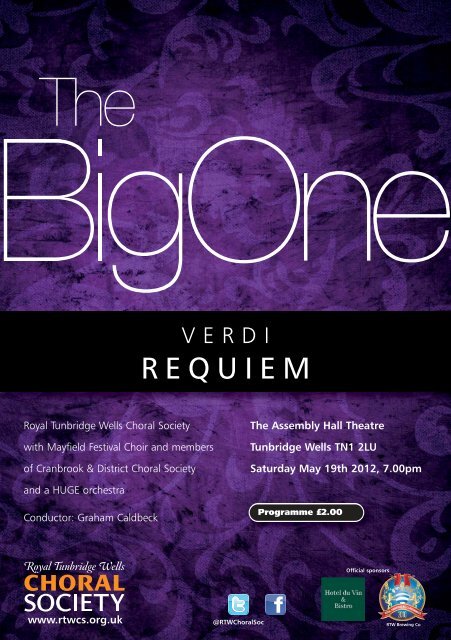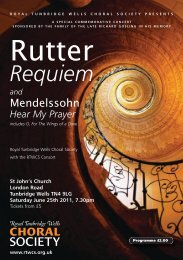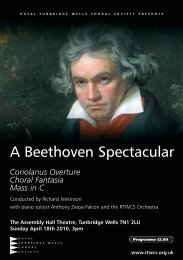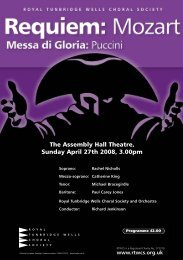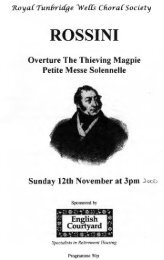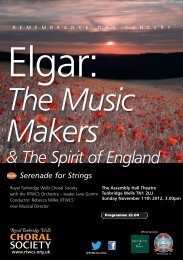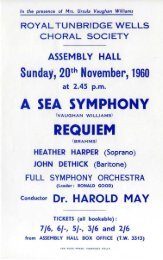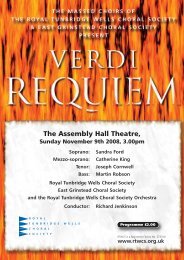REQUIEM - Royal Tunbridge Wells Choral Society
REQUIEM - Royal Tunbridge Wells Choral Society
REQUIEM - Royal Tunbridge Wells Choral Society
Create successful ePaper yourself
Turn your PDF publications into a flip-book with our unique Google optimized e-Paper software.
<strong>Royal</strong> <strong>Tunbridge</strong> <strong>Wells</strong> <strong>Choral</strong> <strong>Society</strong><br />
with Mayfield Festival Choir and members<br />
of Cranbrook & District <strong>Choral</strong> <strong>Society</strong><br />
and a HUGE orchestra<br />
Conductor: Graham Caldbeck<br />
VERDI<br />
<strong>REQUIEM</strong><br />
www.rtwcs.org.uk @RTW<strong>Choral</strong>Soc<br />
The Assembly Hall Theatre<br />
<strong>Tunbridge</strong> <strong>Wells</strong> TN1 2LU<br />
Saturday May 19th 2012, 7.00pm<br />
Programme £2.00<br />
Official sponsors<br />
RTW Brewing Co
ROYAL TUNBRIDGE WELLS CHORAL SOCIETY<br />
Sir Derek & Lady Day<br />
Mr M Hudson<br />
Mr I Hughes<br />
Mrs P Maxwell<br />
President<br />
Roy Douglas<br />
Vice President<br />
Derek Watmough MBE<br />
Conductor<br />
Graham Caldbeck<br />
Accompanist<br />
Anthony Zerpa-Falcon<br />
Honorary Life Members<br />
Len Lee<br />
Patrons<br />
Mr G Huntrods CBE<br />
Mrs W Roszak<br />
Friends<br />
Mr & Mrs D Seaman<br />
Mr R Thatcher<br />
Mrs P Felix<br />
Like the majority of arts-based charities, our ticket sales rarely cover the cost of concerts. We<br />
are therefore most grateful to our Patrons and Friends for their valuable support. A<br />
subscription of £55 or more will ensure you will have a seat of your choice reserved for you<br />
for each of our major concerts throughout the year. If you would like to become a Patron or<br />
Friend please contact Gerald Chew on 01892 527958.<br />
The <strong>Royal</strong> <strong>Tunbridge</strong> <strong>Wells</strong> <strong>Choral</strong><br />
<strong>Society</strong> is a member of NFMS (“Making<br />
Music”) and is a Registered Charity No<br />
273310.<br />
2<br />
Mr W Rutherford<br />
Mr & Mrs G Weller<br />
Mrs J Finch<br />
Mr M Webb<br />
For further information about the<br />
<strong>Society</strong> visit our website<br />
www.rtwcs.org.uk<br />
Publicity by Looker Marketing Communications www.looker.co.uk
Programme<br />
Programme notes<br />
3<br />
Requiem<br />
Giuseppe Verdi (1813 – 1901)<br />
Malcolm Charles Beresford 1946 – 2010<br />
This performance has been made possible largely by a generous legacy from our<br />
much loved colleague, Malcolm Beresford who sang tenor with<br />
RTWCS for many years and sadly passed away in February 2010.<br />
Malcolm was brought up in the Midlands and came south in the ’70s,<br />
working for a small chain of shops as Area Manager before setting up<br />
his own business.<br />
He was a private person, but was very active in the Beresford Family<br />
<strong>Society</strong>, researching the family history going back to 1287. These<br />
records have been computerised for access by the family and others.<br />
He also researched old wills with the help of The National Archives,<br />
some in medieval English and Latin.<br />
He resided in Langton Green where he was able to enjoy musical<br />
activities in the area, particularly with the <strong>Royal</strong> <strong>Tunbridge</strong> <strong>Wells</strong> <strong>Choral</strong><br />
<strong>Society</strong>. He was a kind, cheerful, friendly and hardworking person and<br />
his early death was a loss to many. Tributes have been received from<br />
Beresford’s all over the world and at his funeral on the 5th March<br />
2011 Peter Beresford, Chairman of the Beresford Family <strong>Society</strong>, spoke<br />
about his work and life.<br />
Malcolm’s ashes are interred in Kilndown, close to other Beresford ancestors.<br />
On the 22nd May 1873, in Milan, the great Italian poet and novelist<br />
Allesandro Manzoni slipped on the steps of the church of San Fedele as<br />
he was going in to early morning Mass and was carried home<br />
unconscious. He was 89, and so his ensuing death was not entirely<br />
unexpected; but Verdi had regarded Manzoni with a quite extraordinary<br />
reverence ever since he had read the celebrated classic novel I Promessi<br />
Sposi at the age of 16, and the author’s death left him heart smitten<br />
with emotion and grief. “perhaps after I have thought it over and<br />
measured my strength”, he wrote to Guilio Ricordi, his publisher, “I shall<br />
propose something to honour his memory.” (“Measured my strength” is<br />
interesting. Verdi at 60 was still at the height of his powers: Aida had<br />
been produced only a year earlier. But a really large-scale choral work<br />
was something he had never before attempted, and it presented<br />
unfamiliar problems.) The “something” turned out to be the Requiem,<br />
which had its first performance at St Mark’s Church in Milan on 22nd<br />
May 1874 (the first anniversary of Manzoni’s death), with Verdi himself<br />
composing a specially chosen choir of 120 singers and an orchestra of<br />
110 players. The work was rapturously received by the audience, and<br />
subsequent performances in Paris and Vienna were equally successful.<br />
London, too, was impressed, but there were some reservations<br />
Giuseppe Verdi
expressed concerning the theatrical character of the music – an objection still felt by some.<br />
Theatrical it certainly is; but Verdi was simply using the musical language that came naturally<br />
to him; anything else would have been inconsistent with the depth and sincerity of his<br />
feelings. Furthermore, although the liturgical aspect is respectfully treated, the work was<br />
intended for the concert hall, not the church. A third point concerns the character of the text,<br />
much of which comprises the terrifying medieval Dies Irae sequence, full of vivid – not to say<br />
lurid – imagery of the Last Judgment; for which, it could be argued, the uninhibited approach<br />
of a Berlioz or a Verdi is more appropriate than, say, the more restrained polyphonic settings<br />
of Palestrina and Victoria, fine though they are. But the really clinching argument is, of<br />
course, the overwhelming effectiveness of the music. Verdi’s Requiem is a work of astonishing<br />
imagination, beauty and power. And people who don’t like it (one is tempted to say) don’t<br />
really like music.<br />
Note on applause:<br />
We are more than happy to hear you applaud if you wish to show your appreciation of the<br />
performance! So as to cause as little disruption as possible to the flow of the piece we have indicated<br />
places where there is a suitable pause for applause by the symbol:<br />
1. Requiem and Kyrie<br />
The work opens quietly with a slow falling phrase on muted cellos. A gentle crescendo<br />
leads to a magical change from the minor to the major key. While the chorus murmurs the<br />
prayer for eternal rest. Te decet hymnus, set to a plainsong-flavoured melody for<br />
unaccompanied choir, is followed by a repeat of the hushed opening music. The four<br />
soloists then enter successively with the urgent Kyrie eleison prayer set to a noble theme<br />
with choral accompaniment; and the movement ends with Christe eleison (one of Verdi’s<br />
departures from liturgical tradition): an eight part chordal progression through remote keys<br />
to a final resting point in the ‘home key’ of A Major.<br />
2. Dies lrae<br />
After a startling detonation of four staccato orchestral chords the chorus enters with a wild<br />
swirling theme powerfully expressive of power and grief, quieting down to a sotto voce<br />
monotone at Quantus tremor est futurus. This leads straight into:<br />
i) Tuba mirum. Trumpet fanfares, echoed ‘off-stage’, build up to a climax reinforced by the<br />
choir and the rest of the orchestra. Mors stupebit is given to the bass solo, with a subtle<br />
and effective orchestral accompaniment.<br />
ii) Liber scriptus. The mezzo-soprano enters unaccompanied on the dominant A, reaching<br />
the key chord of D minor with tremendous emphasis on Unde mundus judicetur (When<br />
creation comes to trial). An eloquent solo aria follows, punctuated by Dies irae from the<br />
chorus, whispered at first, then bursting with full force.<br />
iii) Quid sum miser. A trio for the three upper solo voices, accompanied by violins and viola<br />
with a solo bassoon and expressive flowing bass.<br />
iv) Rex tremendae majestatis. The opening words are thundered out by the chorus basses,<br />
followed immediately by entries from all four soloists on Salva me: a reminder that the<br />
majestic King is also the fount of grace (Fons pietatis) whose prerogative is mercy. The<br />
full chorus combines and the movement builds up to a great emotional climax.<br />
v) Recordare. A duet for soprano and mezzo soprano accompanied by a reiterated<br />
rhythmic figure given to the woodwind.<br />
vi) Ingemisco. The tenor soloist takes up the penitential prayer in a mood of tender lyricism<br />
evoked by the reference to Mary Magdalen (Qui Mariam absolvisti).<br />
vii) Confutatis maledictis. This solo bass pleads for mercy at the hour of death in an<br />
expressive aria over a gently throbbing orchestral accompaniment. The final cadence<br />
moves unexpectedly into G minor, and the chorus blazes in again with Dies Irae.<br />
4
viii)Lacrymosa. A simple and unforgettable tune,given first to the mezzo-soprano soloist<br />
and then taken up by the chorus. Pie Jesu Domine is set to a short unaccompanied<br />
passage for the solo quartet.<br />
3. Domine Jesu<br />
The whole movement is set as a solo quartet. One of the great moments of the work comes<br />
with the entry of the soprano as Michael the Standard-Bearer (sed signifer sanctus Michael):<br />
on an E held for five whole bars. With Quam olim Abrahae Verdi seems to hint at the fugue<br />
which is usual at this point, but we are given instead a powerful sequence based on a<br />
falling chromatic scale. Hostias… is set to an exquisite melody which moves within the<br />
compass of five notes; Quam olim Abrahae is repeated, and the movement ends with the<br />
soprano floating gently and prayerfully on a high A flat.<br />
Interval (15 minutes)<br />
4. Sanctus<br />
Trumpet callers usher in the chorus, divided into two choirs,who sing the whole of the<br />
Sanctus, Benedictus and Hosanna in an unbroken double fugue which bounces along<br />
joyfully in striking contrast to the rest of the work. “If it is dance-like,” Donald Tovey writes,<br />
“the dance is that of the Sons of the Morning”.<br />
5. Agnus Dei<br />
The plaintive melody is set with daring originality, for the soprano and mezzo-soprano<br />
soloists, who sing in octaves, unaccompanied. The chorus follows, also in unison octaves.<br />
After the soloists have repeated the tune in the minor, the choir answers with a richly<br />
harmonised version of the last six bars. There is a third statement of the tune by the<br />
soloists decorated with three flutes in flowing counterpoint. Choir, soloists and orchestra<br />
unite at the close.<br />
6. Lux Aeterna<br />
The violins shimmer with the never-fading light, introducing a trio for the three lower solo<br />
voices. The gentle intimate mood of the mezzo soprano’s opening bars gives way to a<br />
darkly coloured funeral chant in B flat minor intoned by the bass. The three voices unite in<br />
a brief unaccompanied passage of luminous part-writing, after which a repetition of Et lux<br />
perpetua, set to a broad lyrical tune, carries the movement along to the end.<br />
7. Libera Me<br />
Here we are back once again with the terror and despair suggested by thoughts of the Last<br />
Judgment. The soprano soloist, and then the chorus, mutter the opening words in<br />
monotone; and after an agitated, intensely dramatic recitative for the soloist the chorus<br />
erupts with the now familiar but always startling Dies irae. There follows a passage of the<br />
most moving beauty: a repeat of Requiem aeternam as heard at the opening of the work,<br />
but with the unaccompanied choir, led by the solo soprano, singing music which was<br />
formerly only given by the orchestra. The work ends with a fugue on Libera me Domine.<br />
Any feeling that its sprightliness is inappropriate to the solemnity of the text is entirely<br />
dispelled when the soprano soloist enters with the theme at half speed and in the major<br />
mode – yet another great moment. The final page has the soloist and chorus murmuring<br />
the prayer for deliverance in a hushed ‘pppp’; and, as one commentator has put it, “the<br />
music ends, poised over the void”.<br />
Bouquets courtesy of<br />
10 Monson Road, <strong>Tunbridge</strong> <strong>Wells</strong> TN1 1ND<br />
T: 01892 549919<br />
5
Performers<br />
Graham Caldbeck – Conductor<br />
Graham is one of Britain’s leading choral conductors, known for his wideranging<br />
musical skills, innovative programming and vital and stylish<br />
performances. RTWCS welcomes him as guest conductor for this concert.<br />
After reading music at Trinity College, Cambridge, where he was a <strong>Choral</strong><br />
Scholar under Richard Marlow, he sang with Guildford Cathedral Choir under<br />
Barry Rose and Winchester Cathedral Choir under Martin Neary and David Hill.<br />
He holds both the Fellowship and Choir Training diplomas of the <strong>Royal</strong><br />
College of Organists and is a former Assistant Organist at St. Martin-in-the-<br />
Fields, London. In September 2004 he took up the position of Director of<br />
Music at St Mary The Boltons, SW10.<br />
Graham was one of the co-founders of Southern Voices and conducted the<br />
choir from 1984 until the end of 1999, establishing it as one of the leading<br />
choirs in the area. He has conducted the Somerset Chamber Choir since 1990<br />
and, from 1996, has also directed the Nonsuch Singers, described by The<br />
Times as ‘one of London’s best chamber choirs’. With both choirs he has<br />
performed with many of the UK’s finest vocal soloists and period instrument ensembles. From<br />
2005 he has also been appointed conductor of the Mayfield Festival Choir in Sussex.<br />
In 2003 he conducted the Nonsuch Singers in the televised world première of Sir John<br />
Tavener’s Exhortation and Kohima as part of the <strong>Royal</strong> British Legion Festival of Remembrance<br />
in the <strong>Royal</strong> Albert Hall, in the presence of Her Majesty the Queen and the composer.<br />
Graham was Head of the Hampshire Specialist Music Course at Peter Symonds College<br />
between 1980 and 1989 and then moved to the <strong>Royal</strong> College of Music where, between 1989<br />
and 2004, he held a succession of senior posts as well as working as an Academic Studies<br />
professor and conducting the Junior Department choirs, RCM Chorus and RCM Chamber<br />
Choir. He left the College to pursue a freelance career as conductor, teacher, vocal coach and<br />
keyboard player.<br />
Jane Gomm – Orchestra Leader<br />
Sussex-born Jane studied the violin at the <strong>Royal</strong> Academy of Music in London.<br />
Since leaving college she has been a member of the London Mozart Players,<br />
the London Festival Orchestra and the Orchestra of St. Johns and in 1986<br />
joined the City of London Sinfonia.<br />
Jane also directs her own chamber music group, The Ruskin Ensemble and<br />
has performed with them at the Edinburgh and Brighton Festivals, the British<br />
Embassy in Paris, Number 11 Downing Street and music clubs and country<br />
houses throughout the British Isles and the Netherlands.<br />
6
Fiona Howell – Soprano<br />
Fiona grew up in Surrey and studied singing, flute and piano at Chetham’s<br />
School of Music in Manchester. After completing her ‘A’ levels she gained an<br />
entry scholarship to the <strong>Royal</strong> Academy of Music where she graduated in June<br />
2010. She continued her studies with Glenville Hargreaves and Iain<br />
Leddingham on the postgraduate course and is due to complete her MA in<br />
June 2012.<br />
Recent operatic performances include opera scenes at the <strong>Royal</strong> Academy of<br />
Music and in Italy where she has played Vitellia in Mozart’s La clemenza di<br />
Tito, Armide in Gluck’s Armide, Fidelio in Beethoven’s Fidelio, La Grande<br />
Pretesse in Rameau’s Hippolyte, Donna Anna in Mozart’s Don Giovanni,<br />
Margerita in Boito’s Mefistofele, Fiordiligi in Mozart’s Cosi fan tutte and Iris<br />
in Handel’s Semele. Other recent concerts include Verdi’s Requiem,<br />
Mendelssohn’s Elijah, Mahler’s Symphony No.4 in G, Mozart’s Sparrow Mass,<br />
Smetana’s The Bartered Bride, Haydn’s Missa Cellensis, Creation and Nelson<br />
Mass, Beethoven’s Mass in C, Handel’s Messiah and Laudate Peuri, Mozart’s<br />
Exsultate Jubilate, Vivaldi’s Gloria and Magnificat, and Faure’s Requiem.<br />
Fiona sings with the <strong>Royal</strong> Academy Bach Choir as part of its Kohn Foundation Cantata series.<br />
She was the soloist for The Battle of Britain 70th anniversary in 2010 and A musical salute to<br />
the <strong>Royal</strong> Air Force in 2011, both held at Chartwell National trust with the central band of<br />
The <strong>Royal</strong> Air Force.<br />
In January 2011 Fiona won the prestigious Dame Eva Turner award for potential dramatic<br />
soprano. Her long term aim is to be a professional opera singer but she also enjoys teaching<br />
and is currently developing her own company, Ancora Music, based in Surrey.<br />
Anna Harvey – Mezzo-Soprano<br />
A postgraduate student at the <strong>Royal</strong> Academy of Music under Elizabeth<br />
Ritchie, Sheffield-born Mezzo-Soprano Anna Harvey is quickly gaining a<br />
reputation as a versatile and expressive performer. Passionate about opera,<br />
Anna has most recently performed roles at Opera Holland Park (Etcetera),<br />
Buxton Opera House and West Road, Cambridge, in repertoire including<br />
Albert Herring (“Harvey’s deliciously fussy Mrs Herring”, Fiona Maddocks, The<br />
Observer, July 2011), Le Nozze di Figaro (Marcellina) and Eugene Onegin<br />
(Filipevnya).<br />
Anna is also equally at home as a concert soloist and recitalist, with recent<br />
highlights including Mozart Requiem and Haydn Nelson Mass in St Martin-inthe-Fields,<br />
Handel Messiah with Guildford Philharmonic and the UK premiere<br />
of Loewe Passion Oratorio. Other concert repertoire includes Brahms Alto<br />
Rhapsody, Duruflé Requiem, Mendelssohn Elijah, and Vivaldi Gloria.<br />
Anna has enjoyed recent masterclasses with Anne Howells, Susan McCulloch<br />
and Lore Lixenburg, and prizes she has won include the David Crighton Prize<br />
and the Lindsays Award.<br />
7
Philip Modino – Tenor<br />
Philip studied singing under John Wakefield, piano under Douglas Finch and<br />
conducting at Trinity College of Music, London and was awarded a Bachelor’s<br />
Degree Honours in Performance. Since then he has appeared across Europe in<br />
roles including Pinkerton, Yamadori / Madame Butterfly, Lensky / Eugine<br />
Onegin, Idomeneo, Gabriele Adorno / Simon Boccanegra, Canio, Pepe /<br />
Pagliacci, Alfredo / La Traviata, Radames / Aida, Creonte /Antigone, Ishmael /<br />
Nabucco, Luigi / Tabarro as well as Dvorak’s Stabat Mater and Puccini’s<br />
Messa di Gloria, Narrator/The two orphans (60 performance tour in Greece).<br />
He has performed in numerous venues such as the National Opera of Greece,<br />
Barbican, St. John’s Smith Square, Teatro della Feria Valladollid and many<br />
more.<br />
He has been awarded the Onassis Scholarship and the Greek Wagner<br />
Gesellschaft Bursary in 2011 and currently attends <strong>Royal</strong> Academy of Music<br />
for a Master in Arts, studying under Philip Doghan.<br />
Michael Bundy – Baritone<br />
Michael, a music graduate of Trinity College, Cambridge and the Guildhall<br />
School of Music and Drama, has performed widely in diverse genres: He has<br />
appeared as soloist with groups such as The Sixteen, The Orchestra of the Age<br />
of Enlightenment and has a continuing relationship with the BBC Singers. His<br />
operatic repertoire exceeds forty roles and he has sung with English National<br />
Opera, Kent Opera, Scottish Opera, the <strong>Royal</strong> Opera, Covent Garden,<br />
Mauritius Opera, and the Narodni Divadlo in Prague: He appeared with<br />
Theater Basel in Actus Tragicus – a new staging of some of Bach’s church<br />
Cantatas by the renowned director Herbert Wernicke – and performed with<br />
Opera Restor’d and the Akademie für Alte Musik, Berlin in their production of<br />
Lampe’s comic opera The Dragon of Wantley at the Musikfestspiele Potsdam.<br />
His Oratorio repertoire is catholic, and broadcasts frequently for BBC Radio 3,<br />
including the oratorio Poèmes Fransiscains by the organist-composer Bonnal.<br />
Work with Trevor Pinnock and The English Concert has included Bach’s Saint<br />
Matthew Passion in Europe, Istanbul and Japan, and he has also appeared as<br />
soloist with Sir John Eliot Gardiner and The English Baroque Soloists in works<br />
such as Berlioz’ L’Enfance du Christ, Handel’s Israel in Egypt (both BBC promenade concerts),<br />
Bach’s B Minor Mass and Haydn’s Nelson Mass and the Odes and Masques of Purcell. He<br />
broadcast the role of Gobryas in Handel’s oratorio Belshazzar with Robert King and the King’s<br />
Consort, and recently sang Elgar’s Dream of Geronitus in Ely and Rochester cathedrals and<br />
the Smetana Hall in Prague. Recent engagements have included a further performance of<br />
Gerontius in the Usher Hall, Edinburgh and Mahler’s Eighth Symphony at the <strong>Royal</strong> Albert<br />
Hall; future highlights include a return visit to the Usher Hall for a performance of Verdi’s<br />
Requiem.<br />
Michael has issued a series of recordings with Naxos featuring the mélodies by Widor, Vierne<br />
and Tournemire. Other commercial recordings include Purcell’s The Fairy Queen (Dantone/<br />
Accademia Bizantia), Chausson’s Le Roi Arthus (Botstein/BBC Symphony Orchestra), Tovey’s<br />
The Bride of Dionysus (Vass/Ulster Orchestra) and, recently, Michael Hurd’s opera The Widow<br />
of Ephesus.<br />
The <strong>Royal</strong> <strong>Tunbridge</strong> <strong>Wells</strong> <strong>Choral</strong> <strong>Society</strong> gratefully acknowledges the financial support of the<br />
Josephine Baker Trust for Anna Harvey and Philip Modino in this evening’s concert.<br />
8
<strong>Royal</strong> <strong>Tunbridge</strong> <strong>Wells</strong> <strong>Choral</strong> <strong>Society</strong> Orchestra<br />
Violin 1<br />
Jane Gomm – leader<br />
Greg Warren-Wilson<br />
Anne Martin<br />
Ingrid Sellschop<br />
Tim Good<br />
Anna Szabo<br />
Violin 2<br />
Andrew Lang<br />
Rachel Ayres<br />
Julia Chelell<br />
Shareen Godber<br />
Julia Brocklehurst<br />
Viola<br />
Stephen Shakeshaft<br />
Martin Fenn<br />
Lynn Whitley<br />
Jane Taunton<br />
Cello<br />
Robert Truman<br />
Sonia Smith<br />
Anita Strevens<br />
Lawrence Durkin<br />
Double bass<br />
Robert Hart<br />
Colin Moore<br />
Ingela Weeks<br />
Flute<br />
Libby Summers<br />
Claire Langford<br />
Piccolo<br />
Sarah Wicks<br />
Oboe<br />
Christopher Hooker<br />
Juliet Lewis<br />
Coming soon… RTWCS’ new Musical Director<br />
RTWCS is please to announce the appointment of Rebecca Miller as our new<br />
Musical Director. She will be commencing in her role from the beginning of<br />
the 2012/13 season in September. She was selected from the many<br />
applicants for her mightily impressive experience and infectious enthusiasm.<br />
Of course being our first female musical director in 108 years adds an extra<br />
dimension!<br />
Acclaimed by both press and audiences as a compelling, insightful and<br />
energetic force on the podium, Rebecca is at home in both the orchestral<br />
and choral worlds. As First Prize winner in the Eduardo Mata International<br />
Conducting Competition in Mexico City, she has guest conducted extensively<br />
in Mexico, including repeat performances with the National Symphony of<br />
Mexico, the Orquesta Filarmonica del UNAM, among many others. In 2010,<br />
she completed a highly successful tenure as Resident Conductor of the<br />
Louisiana Philharmonic Orchestra, where she ran her own series, the Casual<br />
Classics, as well as conducted classical, community, education, and crosscultural<br />
and cross-genre performances, and where she was particularly<br />
admired for her ability to communicate with audiences of all ages. Among her guest<br />
conducting credits are performances with the Southbank Sinfonia, the Chicago College of the<br />
Performing Arts, the London Sinfonietta, the Reno Philharmonic, the Huntsville Symphony, the<br />
Orchestra of the Swan, and the Jerusalem Symphony. Rebecca’s previous positions include<br />
being Conducting Fellow of the Houston Symphony, Assistant Conductor of the Jerusalem<br />
Symphony, Junior Fellow at the <strong>Royal</strong> College of Music, Music Director of the Kingston<br />
University Orchestra and Chorus, and Music Director of the Sine Nomine Singers.<br />
She has released two CDs with her critically-acclaimed orchestra, The New Professionals, the<br />
latter of which received an ‘Outstanding Recording’ award from International Record Review,<br />
and ‘Recording of the Year’ by MusicWeb International. Rebecca trained as a pianist and<br />
soprano at the Oberlin Conservatory of Music and at Northwestern University, and is based in<br />
London with her two children and her husband, British pianist Danny Driver. She says she is<br />
delighted to have been appointed as Music Director of the <strong>Royal</strong> <strong>Tunbridge</strong> <strong>Wells</strong> <strong>Choral</strong><br />
<strong>Society</strong> and looks forward opening an exciting new chapter in the chorus’s impressive history.<br />
More information about Rebecca can be found at www.rebeccamiller.net.<br />
9<br />
Clarinet<br />
Kate Fish<br />
Alison Sutton<br />
Bassoon<br />
Jonathan Price<br />
Jo Turner<br />
Howard Legge<br />
Rachel Edmunds<br />
Horn<br />
Ian Stott<br />
Jason Koczur<br />
Suzie Koczur<br />
Kate Goldsmith<br />
Trumpet<br />
Matt <strong>Wells</strong><br />
Rob Domingue<br />
Chris Avison<br />
Andy Hendrie<br />
Off stage<br />
trumpets<br />
Alex Caldon<br />
Simon Strugeon-Clegg<br />
Richard Thomas<br />
Patrick Dodds<br />
Trombone<br />
Amy Wetmore<br />
Geoffrey Batchelor<br />
Alastair Warren<br />
Cimbasso<br />
Andrew Kershaw<br />
Timpani<br />
Sebastian Guard<br />
Percussion<br />
Tony Wagstaff
The choir<br />
In November 1904 rehearsals began for the <strong>Royal</strong> <strong>Tunbridge</strong> <strong>Wells</strong> <strong>Choral</strong> <strong>Society</strong>’s first<br />
concert, a performance of Brahms’ Requiem, under the baton of its founder, Francis J<br />
Foote, in May 1905. The <strong>Society</strong> has been staging concerts almost every year for over a<br />
hundred years since that inaugural concert. Recent highlights have been the concert to<br />
celebrate our Centenary in 2004, when we welcomed the Bach Choir of Wiesbaden to sing<br />
with us, many other joint concerts with them, both here and in Wiesbaden and a<br />
performance of Haydn’s The Creation in November 2007 to celebrate the 100th birthday of<br />
our distinguished President, Roy Douglas.<br />
The <strong>Society</strong> continues to flourish as membership and audiences grow and we look forward<br />
to a future of many more memorable concerts. If you are interested in joining the choir<br />
please email our General Secretary at general.secretary@rtwcs.org.uk.<br />
For this evening’s concert we are pleased to welcome our friends from two neighbouring<br />
choral societies. It has been a pleasurable and instructive process rehearsing with them –<br />
we look forward to doing so again.<br />
The Mayfield Festival Choir was re-founded as a <strong>Society</strong> in 2004, following the<br />
appointment of Graham Caldbeck, this evenings guest conductor, as musical director and<br />
conductor. The Choir performs at least two concerts a year in the magnificent setting of<br />
historic St. Dunstan's Church, Mayfield – the May concert every other year being part of the<br />
Mayfield Festival of Music and the Arts.<br />
The Choir rehearses and performs a range of music unusual in its breadth and challenge<br />
and has become noted for its vibrant, committed performances of an exciting repertoire.<br />
Cranbrook <strong>Choral</strong> <strong>Society</strong> was formed in 1969 although occasional choral concerts have<br />
been staged in Cranbrook since Victorian times. These were put on a more regular footing<br />
in the 1950s by Mrs Russell-Scott, wife of the headmaster at Cranbrook School and<br />
comprised mainly of ladies from the WI. The present society has over 70 members,<br />
presenting many of the greatest works in the choral repertoire, mainly Oratorios, Masses<br />
and Requiems and attracts soloists who have gone on to the very top of their profession.<br />
In 1987, the Director of Music at Cranbrook School, Malcolm Riley, came to the podium.<br />
Under him the choir has gone from strength to strength both in its number of singers and<br />
in the ambitious works undertaken. This evening we are pleased to welcome him as a<br />
choral singer after RTWCS had the pleasure of serving under his baton for our Autumn<br />
2011 performance of Mendelssohn’s Elijah, when he was guest conductor for our own<br />
<strong>Royal</strong> <strong>Tunbridge</strong> <strong>Wells</strong> <strong>Choral</strong> <strong>Society</strong>.<br />
10
<strong>Royal</strong> <strong>Tunbridge</strong> <strong>Wells</strong> <strong>Choral</strong> <strong>Society</strong> singers<br />
Sopranos<br />
Elaine Abbs<br />
Diana Blower<br />
Sylvia Byers<br />
Heather Champion<br />
Susan Chandler<br />
Maureen Chapman<br />
Jane Cole<br />
Patsy Dale<br />
Diana Dann<br />
Altos<br />
Aisher Alisoun<br />
Butcher Margaret<br />
Coxshall Pauline<br />
Davies Mair<br />
Finch Jean<br />
Finlay Joanna<br />
Flood Peggy<br />
Gall Eileen<br />
Tenors<br />
Guy Huntrods<br />
Gareth Looker<br />
John Simmons<br />
Alan Spencer<br />
Neil Townsend<br />
Derek Watmough<br />
Tenors<br />
Peter Driscoll<br />
Madeleine Farbrother<br />
Jonathan Howard<br />
Annette Nabavi<br />
John Richardson<br />
Davidoff Aspen<br />
Jill Dunstall<br />
Nina Filbey<br />
Elena Gente<br />
Ann Greenfield<br />
Katy Hawes<br />
Penny Hamilton<br />
Barbara Hazelden<br />
Heather Hemmings<br />
Gray Ruth<br />
Harrison Sharon<br />
Herrin Heather<br />
Jeffries Lynn<br />
Jones Sheila<br />
Lewis Jane<br />
Lyall Margaret<br />
Mcmahon Ailsa<br />
11<br />
Rosemary Hughes<br />
Eve Johnson<br />
Jenny Jessup<br />
Elena Lewis-Grey<br />
Karen Maier<br />
Helen MacNab<br />
Barbara Maw<br />
Anne Metherall<br />
Louise Packham<br />
Morgan Shirley<br />
Nankivell Shirley<br />
Parsons Sylvia<br />
Penny Gillian<br />
Rigby Catherine<br />
Robertson Rosalyn<br />
Ryan Celestine<br />
Seaman Olivia<br />
Basses<br />
Roy Dunstall<br />
Ellis Giles<br />
Gavin Grant<br />
David Ham<br />
Mark Hudson<br />
Trevor Hurrell<br />
David Lyall<br />
Mayfield Festival Choir singers<br />
Sopranos<br />
Patricia Balfour<br />
Jane Bolger<br />
Wil Crittenden<br />
Hazel Davie<br />
Maura Fanshawe<br />
Pamela Francis<br />
Sheila Lockwood<br />
Barbara Moreton<br />
Anne Richardson<br />
Patta Scott<br />
Altos<br />
Christine Armstrong<br />
Valerie Buddle<br />
Kathy Cooper<br />
Sheila Mackenzie<br />
Mary Moore<br />
Basses<br />
Michael Chapman<br />
Rodney Doidge<br />
David Hollands<br />
Robin Howden<br />
John Procter<br />
Cranbrook <strong>Choral</strong> <strong>Society</strong> singers<br />
Sopranos<br />
Julie Ford<br />
Anne Owen<br />
Sarah Speller<br />
Altos<br />
Mary Castelino<br />
Melanie Riley<br />
Harriet Riley<br />
Tenor<br />
Ian Fletcher<br />
Malcolm Riley<br />
Chris Riley<br />
Pat Prior<br />
Helena Read<br />
Jane Reed<br />
Ann Spillman<br />
Claire Summons<br />
Sue Townsend<br />
Audrey Wallin<br />
Linda Wilson<br />
Spencer Yvonne<br />
Sumner Celia<br />
Thatcher Muriel<br />
Walters Jane<br />
Wilkin Felicity<br />
Williams Joelle<br />
David Miller<br />
John Moffat<br />
Mark Rees<br />
Eric Scott<br />
Michael Selway<br />
John Spary<br />
Clive Steward<br />
Phyllida de Salis<br />
Jackie Scott<br />
David Thompson<br />
Len Trevillion<br />
Richard Williams<br />
Keith Willson<br />
Basses<br />
Peter Hoole<br />
Philip Sulley
The words<br />
Introitus and Kyrie: Soloists & chorus<br />
Requiem aeternam dona eis, Domine, et lux<br />
perpetua luceat eis.<br />
Te decet hymnus, Deus, in Sion, et tibi<br />
reddetur votum in Jerusalem.<br />
Exaudi orationem meam, ad te omnis caro<br />
veniet.<br />
Kyrie eleison. Christe eleison. Kyrie eleison.<br />
Dies Irae: Soloists & chorus<br />
Dies irae, dies illa solvet saeclum in favilla,<br />
teste David cum Sybilla.<br />
Quantus tremor est futurus, quando Judex<br />
est venturus cuncta stricte discussurus.<br />
Tuba Mirum: Bass & chorus<br />
Tuba mirum spargens sonum per sepulchra<br />
regionum coget omnes ante thronum.<br />
Mors stupebit et natura cum resurget<br />
creatura Judicanti responsura.<br />
Liber Scriptus: Mezzo soprano & chorus<br />
Liber scriptus proferetur, in quo totum<br />
continetur unde mundus judicetur. Judex<br />
ergo cum sedebit, quidquid latet apparebit,<br />
nil inultum remanebit.<br />
Dies irae, dies illa solvet saeclum in favilla,<br />
teste David cum Sybilla.<br />
Quid Sum Miser: Soprano, mezzo soprano & chorus<br />
Quid sum, miser, tunc dicturus, quem<br />
patronem rogaturus cum vix justus sit<br />
securus?<br />
Rex Tremendae: Solo quartet & chorus<br />
Rex Tremendae majestatis, qui salvandos<br />
salvas gratis, salva me, fons pietatis.<br />
Recordare: Soprano & mezzo soprano<br />
Recordare, Jesu pie, quod sum causa tuae<br />
viae, ne me perdas illa die. Quaerens me<br />
sedisti lassus, redemisti crucem passus,<br />
tantus labor non sit cassus.<br />
Juste Judex ultionis, donum fac remissionis<br />
ante diem rationis.<br />
12<br />
Grant them eternal rest, Lord, and let<br />
perpetual light shine on them.<br />
A hymn becometh Thee, O God in Sion,<br />
and a vow shall be paid to Thee in<br />
Jerusalem.<br />
Hear my prayer, to Thee all flesh shall come.<br />
Lord, have mercy upon us. Christ, have<br />
mercy upon us.<br />
Day of wrath, that day shall dissolve the<br />
world in ashes, as David and the Sybil testify.<br />
How much trembling there will be, when the<br />
Judge has come to weigh all things exactly.<br />
The trumpet scattering wondrous sound<br />
through the graves of every land will drive<br />
all before the the thrones. Death and nature<br />
will be astounded when creation rises again<br />
to answer the Judge.<br />
A book of writings shall be brought<br />
containing everything for which the world<br />
will be judged. Therefore when the Judge<br />
sits whatever is hidden will appear, nothing<br />
will go unavenged.<br />
Day of wrath, that day shall dissolve the<br />
world in ashes, as David and the Sybil<br />
testify.<br />
What shall I, wretch that I am, say then?<br />
Whose patronage shall I ask when the<br />
righteous are hardly safe?<br />
King of dread majesty, who freely savest<br />
the redeemed, save me, fount of pity.<br />
Remember, merciful Jesus, that I am the<br />
cause of Thy journey, let me not be lost on<br />
that day. Seeking me Thou didst suffer on<br />
the Cross, let not such travail be in vain.<br />
Just Judge of vengeance, grant me the gift<br />
of remission before the day of reckoning.
Ingemisco: Tenor<br />
Ingemisco tanquam reus, culpa rubet vultus<br />
meus, supplicanti parce, Deus. Qui Mariam<br />
absolvisti et latronem exaudisti, mihi<br />
quoque spem dedisti. Preces meae non sunt<br />
dignae, sed tu bonus fac benigne, ne<br />
perenni cremer igne. Inter oves locum<br />
praesta, et ab haedis me sequestra,<br />
statuens in parte dextra.<br />
Confutatis: Bass & chorus<br />
Confutatis maledictus, flammis acribus<br />
addictis, voca me cum benedictis. Oro<br />
supplex et acclinis, cor contritum quasi<br />
cinis, gere curam mei finis.<br />
Dies irae, dies illa solvet saeclum in favilla,<br />
teste David cum Sybilla.<br />
Lacrimosa: Soloists & chorus<br />
Lacrimosa dies illa, qua resurget ex favilla<br />
judicandus homo reus. Huic ergo parce<br />
Deus. Pie Jesu Domine, dona eis requiem.<br />
Amen.<br />
Interval (15 minutes)<br />
13<br />
I groan as one guilty, my countenance<br />
blushes with guilt, spare the supplicant, O<br />
God. Thou who didst absolve Mary and<br />
listen to the robber hast given me hope<br />
also. My prayers are unworthy, but Thou,<br />
good Lord, have mercy lest I burn in<br />
everlasting fire. Allow me a place among<br />
the sheep, and from the goats divide me,<br />
setting me upon Thy right hand.<br />
When the wicked are confounded and<br />
consigned to bitter flames, call me with the<br />
blessed. I pray, a kneeling supplicant, my<br />
heart contrite as ashes, take into Thy care<br />
my end.<br />
Day of wrath, that day shall dissolve the<br />
world in ashes, as David and the Sybil<br />
testify.<br />
Sorrowful that day when rising from the<br />
ashes sinful man goes to be judged.<br />
Therefore spare him, O God. Good Lord<br />
Jesus, grant them rest. Amen.
Domine Jesu: Solo quartet<br />
Domine Jesus Christe, Rex gloriae, libera<br />
animas omnium fidelium defunctorum de<br />
poenis inferni et de profundo lacu; libera<br />
eas de ore leonis, ne absorbeat eas tartarus,<br />
ne cadant in obscurum; sed signifer sanctus<br />
Michael repraesentet eas in lucem sanctam.<br />
Quam olim Abrahae promisisti et semini<br />
ejus. Hostias et preces tibi, Domine, laudis<br />
offerimus; tu suscipe pro animabus illis<br />
quarum hodie memoriam facimus; fac eas,<br />
Domine, de morte transire ad vitam. Quam<br />
olim Abrahae promisisti et semini ejus.<br />
Sanctus: Fugue for double chorus<br />
Sanctus, sanctus, sanctus, Dominus Deus<br />
Sabaoth. Pleni sunt coeli et terra gloria tua.<br />
Hosanna in excelsis.<br />
Benedictus qui venit in nomine Domini.<br />
Hosanna in excelsis.<br />
Agnus Dei: Soprano, mezzo soprano & chorus<br />
Agnus Dei, qui tollis peccata mundi, dona<br />
eis requiem sempiternam.<br />
Lux Aeterna: Mezzo soprano tenor & bass<br />
Lux aeterna luceat eis, Domine, cum sanctis<br />
tuis in aeternum, quia pius es. Requiem<br />
aeternam dona eis, Domine, et lux perpetua<br />
luceat eis. Cum sanctis tuis in aeternum,<br />
quia pius es.<br />
Libera Me: Soprano & chorus<br />
Libera me, Domine de morte aeterna in die<br />
illa tremenda; quando coeli movendi sunt et<br />
terra; Dum veneris judicare saeculum per<br />
ignem.<br />
Tremens factus sum ego, et timeo, dum<br />
discussio venerit atque ventura ira, quando<br />
coeli movendi sunt et terra.<br />
Dies irae, dies illa calamitatis et miseriae,<br />
dies magna et amara valde.<br />
Requiem aeternam dona eis, Domine, et lux<br />
perpetua luceat eis<br />
Libera me, etc<br />
14<br />
Lord Jesus Christ, King of glory, deliver the<br />
souls of all the faithful departed from the<br />
pain of hell and from the deep pit; deliver<br />
them from the lion’s mouth, lest hell<br />
swallow them, lest they fall into darkness;<br />
and let the standard-bearer, St Michael,<br />
bring them into the holy light, which Thou<br />
didst promise of old to Abraham and his<br />
seed. We offer Thee, Lord, sacrifice of<br />
prayers and praise; receive them for those<br />
whom this day we commemorate; make<br />
them, Lord to pass from death to life;<br />
which Thou didst promise of old to<br />
Abraham and his seed.<br />
Holy, holy, holy Lord God of Hosts. Heaven<br />
and Earth are full of Thy glory. Hosanna in<br />
the highest.<br />
Blessed is he who cometh in the name of<br />
the Lord. Hosanna in the highest.<br />
Lamb of God, Who takest away the sins of<br />
the world, grant them eternal rest.<br />
Let eternal light shine upon them Lord, with<br />
Thy saints for ever, for Thou art merciful.<br />
Grant them eternal rest, Lord, and let<br />
perpetual light shine on them. With Thy<br />
saints for ever, for Thou art merciful.<br />
Deliver me, O Lord, from eternal death, on<br />
that awful day, when the heavens shall be<br />
moved, and the earth; When thou shalt<br />
come to judge the world by fire.<br />
I am siezed by trembling, and I fear the<br />
moment when the trial comes, and the<br />
coming wrath, when the heavens shall be<br />
moved, and the earth.<br />
A day of wrath, that day of calamity and<br />
misery, an exceedingly great and bitter day.<br />
Grant them eternal rest, O Lord and let<br />
perpetual light shine upon them.<br />
Deliver me, O Lord etc
Forthcoming concerts to be given by the choir<br />
Autumn 2012: Jubilee Concert<br />
Sunday 11th November, 3pm<br />
The Assembly Hall Theatre,<br />
<strong>Tunbridge</strong> <strong>Wells</strong>, TN1 2LU<br />
Elgar: The Music Makers<br />
Elgar: The Spirit of England<br />
Christmas Concert 2012<br />
Sunday December 16th, 6.30pm<br />
St Mary’s Church,<br />
Goudhurst TN17 1AN<br />
Spring Concert 2013<br />
Sunday 7th April 2013,3pm<br />
The Assembly Hall Theatre,<br />
<strong>Tunbridge</strong> <strong>Wells</strong>, TN1 2LU<br />
Beethoven: 9th Symphony (The <strong>Choral</strong>) with<br />
the <strong>Royal</strong> <strong>Tunbridge</strong> <strong>Wells</strong> Symphony<br />
Orchestra<br />
Other local concerts<br />
Paddock Wood <strong>Choral</strong> <strong>Society</strong><br />
Saturday 16th June 2012 at 7.30pm;<br />
St Andrew’s Church, Paddock Wood<br />
<strong>Choral</strong> Spectacular: Lloyd Webber, Gershwin,<br />
Handel, Fauré<br />
www.paddockwood-choral.org.uk<br />
Penshurst <strong>Choral</strong> <strong>Society</strong><br />
Sunday 10th June 2012 at 7.30pm;<br />
St John the Baptist, Penshurst<br />
Opera Choruses<br />
www.penshurstchoralsociety.co.uk<br />
15<br />
<strong>Royal</strong> <strong>Tunbridge</strong> <strong>Wells</strong><br />
Symphony Orchestra<br />
Sunday 7th October 2012 at 3.00pm;<br />
The Assembly Hall Theatre,<br />
<strong>Tunbridge</strong> <strong>Wells</strong>, TN1 2LU<br />
Roderick Dunk: conductor<br />
Simon Preston: organ<br />
Chabrier: España<br />
Debussy: Prélude à l’après-midi d’un faune<br />
Poulenc: Organ Concerto<br />
Saint-Saëns: Symphony No. 3 ‘Organ’<br />
www.rtwso.org.uk
For more information about<br />
<strong>Royal</strong> <strong>Tunbridge</strong> <strong>Wells</strong> <strong>Choral</strong> <strong>Society</strong> visit<br />
www.rtwcs.org.uk<br />
Join as a singer<br />
Archive<br />
programmes and<br />
reviews<br />
Future events<br />
About us<br />
How you can<br />
support us<br />
Advance concert information<br />
We hope you enjoyed this concert – if so, you may like to be kept informed about our future<br />
concerts. Please fill in your details below and return to us and we will send you advance<br />
information as it becomes available.<br />
Please send me advance information about RTWCS concerts.<br />
Title (Mr/Mrs/Miss/Ms) ________________ First name ____________________________________<br />
Surname __________________________________________________________________________<br />
Address __________________________________________________________________________<br />
Postcode ______________________ Email ______________________________________________<br />
Please return to: Gareth Looker (RTWCS Publicity Officer),<br />
1 Petreed Cottages, Eastbourne Road, Uckfield, East Sussex, TN22 5QL<br />
16
The George Inn<br />
High Street, Robertsbridge East Sussex TN32 5AW<br />
��������������������������������������������������<br />
Fancy a Summer treat?<br />
Bar, Restaurant & Rooms<br />
17
More culture<br />
at lower cost<br />
Become a Friend or Patron of the <strong>Royal</strong><br />
<strong>Tunbridge</strong> <strong>Wells</strong> <strong>Choral</strong> <strong>Society</strong><br />
For just £55 for the season, a Friend receives a complimentary ticket for the best seat in the<br />
house for all four concerts given in the RTWCS season. This is less than the cost of the same<br />
four tickets bought separately for each concert. So not only are you helping to fund the cost<br />
of performing some of the greatest pieces from the music repertoire – you can actually save<br />
money in the process!<br />
Furthermore, Friends receive periodic Newsletters and have first choice of seats where these are<br />
numbered (as in the Assembly Hall Theatre) or can ask for a seat to be reserved where these are<br />
not numbered. Many of our audience who regularly attend concerts with a partner or friend<br />
buy two Friend Season Tickets but those with just one season ticket can always purchase<br />
additional tickets for individual concerts.<br />
Like the majority of arts-based charities, our tickets rarely cover the cost of concerts. Some of<br />
our Friends add a small donation to the cost of their season ticket but this is entirely<br />
voluntary. Anyone wishing to become a Patron is asked to make a donation of £45, bringing<br />
the total to £100 per season.<br />
Unless they ask not to be included, the names of Friends and Patrons are listed in our concert<br />
programmes in recognition of their support to the society.<br />
Why should you be interested?<br />
The <strong>Royal</strong> <strong>Tunbridge</strong> <strong>Wells</strong> <strong>Choral</strong> <strong>Society</strong> season runs from November to the following June.<br />
Major works carefully selected for their audience appeal are performed in the Autumn<br />
(November), the Spring (April) and the early Summer in June. In addition, a popular concert of<br />
carols and Christmas music is held in December. The treats in store for the 2012/13 season are<br />
to be:–<br />
An Elgar programme comprising The Music Makers and The Spirit of England in the<br />
<strong>Tunbridge</strong> <strong>Wells</strong> Assembly Hall Theatre on Armistice Day, the 11th of November.<br />
The annual Christmas Concert in St. Mary’s Church, Goudhurst on Sunday evening, the<br />
16th of December. (The church is always full for this popular event).<br />
A very special occasion on the 7th April when we join forces with the <strong>Royal</strong> <strong>Tunbridge</strong><br />
<strong>Wells</strong> Symphony Orchestra in the Assembly Hall for Beethoven’s 9th Symphony.<br />
And for our fourth event of the year, a summer concert to be held in June 2013, the<br />
venue and programme of which is yet to be finalised.<br />
More information<br />
Anyone who would like more information or would like to become a Friend or Patron is<br />
asked to contact Gerald Chew by telephone (01892 527958) or by email<br />
(geraldchew@uwclub.net).<br />
The support of our Friends and Patrons is greatly appreciated.<br />
18
Couture cookies<br />
for every special occasion<br />
Transform your party and impress your guests with beautiful<br />
handmade cookies from Elena Gente. Choose from a selection of<br />
designs – or we can design specially to your specification.<br />
www.elenagente.com elenagente@googlemail.com 07800 920492


